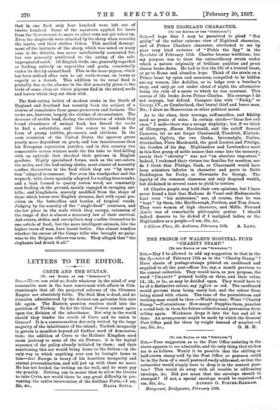THE HIGHLAND CHARACTER,
[To THE EDITOR OF THE " SPECTATOR:1 SIR,—I hope that I may be permitted to plead "Not guilty" of the rather extreme view of Highland character, and of Prince Charles's character, attributed to me by your very kind reviewer of "Pickle the Spy" in the Spectator of February 13th. Charles became worthless; but my purpose was to show the extraordinary strain under which a nature originally of brilliant qualities and great charm broke down. He had to live the life of a hunted beast, or go to Rome and abandon hope. Think of the strain on a Prince beset by spies and assassins, compelled to be hidden among women, like Achilles, or to lodge over a butcher's shop, and only go out under cloud of night, the alternative being the ruin of a cause to which he was constant. Thia course of life broke down Prince Charles. His courage I do not impugn, but defend. Compare him with " Fecky," or George IV., or Cumberland, that brutal thief and brave man. No; I draw no Hanoverian or other political moral.
As to the clans, their courage, self-sacrifice, and fidelity need no praise of mine. In certain chiefs—" these few evil ones," I said—there was a savage duplicity ; but if we think of Glengarry, .1Eneas Macdonald, and the caitiff Samuel Cameron, let us not forget Clanranald, Tiendrisb, Kinloch- moidart, Ogilvie, the two Gasks, Invernahyle, Nairne, Strathallan, Flora Macdonald, the good Lochiel, and Pitsligo, the Gordon of his day. Highlanders and Lowlanders meet in this first group of noble names that come into the memory ;. surely their " chivalry " was not "an absolute imposture?' Indeed, I reckoned their virtues too familiar for mention, nor- do I think that Piteligo, Gask, or Clanranald would have been ministers inferior in character and parts to Bubb Doddington for Fecky, or Newcastle for George. The- loyalty of the common clansmen not only despised wealth, but disdained in several cases to yield to torture.
Of Charles people may hold their own opinions, but I have never found a hint that Madame de Vasse and Mademoiselle- Luci were "his mistresses," nor, of course, that he was " kept " by them, like Marlborough, Porthos, and Tom Jones. They were women of high character, and Mdlle. Ferrand (Luci) was of remarkable philosophic genius. I should indeed deserve to be dirked if I maligned ladies, or the Highlanders as a people.—I am, Sir, &c.,
S Gibson Place, St. Andrews, February 15th. A. LANG.


































 Previous page
Previous page